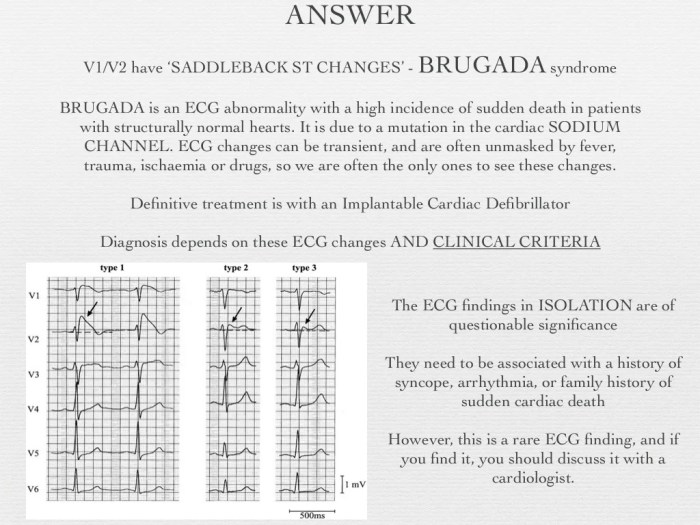Kaiser Permanente EKG Test Questions delves into the intricacies of electrocardiography, empowering you with a comprehensive understanding of EKG testing protocols, interpretation, and clinical significance. Join us on an illuminating journey into the heart of cardiac diagnostics.
Within the confines of this guide, we unravel the intricacies of EKG tracings, providing a roadmap for deciphering the electrical language of the heart. From common abnormalities to the limitations of EKG testing, we arm you with the knowledge to navigate the complexities of cardiovascular health.
EKG Test Overview

An electrocardiogram (EKG) is a non-invasive test that records the electrical activity of the heart. It is used to detect abnormal heart rhythms, diagnose heart conditions, and assess the effectiveness of heart medications.
Procedure
During an EKG test, 10 electrodes are placed on the chest, arms, and legs. These electrodes are connected to an EKG machine, which records the electrical impulses generated by the heart. The test is typically painless and takes about 10 minutes to complete.
Equipment
The EKG machine is a device that amplifies and records the electrical signals from the heart. It consists of a recording unit, electrodes, and a display screen. The recording unit stores the EKG data, which can be printed out or viewed on the display screen.
Kaiser Permanente EKG Test

Kaiser Permanente is a renowned healthcare organization that provides comprehensive medical services, including EKG testing. Kaiser Permanente follows specific protocols for EKG testing to ensure accurate and timely diagnosis of heart-related conditions.
Test Availability
Kaiser Permanente offers EKG testing at its medical centers and clinics. The test is available by appointment or on a walk-in basis, depending on the location and availability.
Scheduling, Kaiser permanente ekg test questions
To schedule an EKG test at Kaiser Permanente, you can call the appointment line or use the online patient portal. You will need to provide your personal information, medical history, and insurance information.
Interpretation
Kaiser Permanente’s EKG tests are interpreted by board-certified cardiologists. The cardiologists will review the EKG recording and provide a report with the results. The report will include any abnormalities detected and recommendations for further evaluation or treatment.
EKG Test Interpretation

An EKG tracing consists of several components, including P waves, QRS complexes, and T waves. The P wave represents atrial depolarization, the QRS complex represents ventricular depolarization, and the T wave represents ventricular repolarization. The EKG tracing also includes intervals, such as the PR interval and the QT interval, which can provide information about the conduction of electrical impulses through the heart.
EKG results are analyzed and interpreted by a healthcare professional, such as a cardiologist. The healthcare professional will look for abnormalities in the EKG tracing, such as changes in the shape or duration of the waves or intervals. These abnormalities can indicate underlying heart conditions, such as arrhythmias, heart attacks, or heart failure.
Common EKG Abnormalities
Some common EKG abnormalities include:
- Arrhythmias: These are abnormalities in the heart rate or rhythm. Arrhythmias can be caused by a variety of factors, such as electrolyte imbalances, medications, or underlying heart conditions.
- Heart attacks: A heart attack occurs when blood flow to the heart is blocked. This can cause damage to the heart muscle, which can be seen on an EKG as changes in the ST segment or T wave.
- Heart failure: Heart failure occurs when the heart is unable to pump enough blood to meet the body’s needs. This can cause a variety of symptoms, such as shortness of breath, fatigue, and swelling in the legs. Heart failure can be seen on an EKG as changes in the QRS complex or the T wave.
It is important to note that not all EKG abnormalities are indicative of a serious heart condition. Some EKG abnormalities can be caused by factors such as anxiety, caffeine, or smoking. If you have any concerns about your EKG results, it is important to talk to your doctor.
EKG Test Preparation

Before an EKG test, it is essential to prepare adequately to ensure accurate and reliable results. Here are some guidelines to follow:
- Avoid caffeine and alcohol:Caffeine and alcohol can interfere with the electrical signals in the heart, affecting the EKG readings.
- Fast for 8-12 hours before the test:Fasting helps reduce abdominal gas, which can distort the EKG signals.
- Remove all jewelry:Metal jewelry can interfere with the EKG electrodes.
- Wear loose, comfortable clothing:Tight clothing can restrict chest movement, affecting the EKG readings.
- Inform the doctor about any medications:Certain medications can affect heart rhythm, so it is crucial to inform the doctor about any medications being taken.
- Bring a list of symptoms:Note down any symptoms experienced, such as chest pain, shortness of breath, or palpitations, to share with the doctor.
During the Test
During the EKG test, the patient will be asked to lie down on an examination table. The technician will place electrodes on the chest, arms, and legs. These electrodes are connected to the EKG machine, which records the electrical signals of the heart.
The test usually takes about 10-15 minutes.
After the Test
After the EKG test, the patient can resume normal activities immediately. The doctor will review the EKG results and discuss any findings or concerns with the patient.
EKG Test Limitations

While EKGs are a valuable diagnostic tool, they have certain limitations:
Sensitivity and Specificity
EKGs have limited sensitivity, meaning they may not always detect heart problems. Additionally, they have limited specificity, meaning they may sometimes indicate a heart problem when none exists (false positive).
Rhythm Interpretation
EKGs can only provide information about the heart’s electrical activity at the time of the test. They may not capture intermittent arrhythmias or changes that occur outside the recording period.
Other Diagnostic Tests
In some cases, other diagnostic tests may be necessary to confirm or further evaluate heart conditions, such as:
- Echocardiogram (ultrasound of the heart)
- Stress test
- Cardiac catheterization
- Holter monitor (portable EKG that records heart activity over 24 hours)
Key Questions Answered: Kaiser Permanente Ekg Test Questions
What is the purpose of an EKG test?
An EKG test records the electrical activity of the heart, providing insights into its rhythm, rate, and any abnormalities.
How should I prepare for an EKG test?
Avoid caffeine and alcohol before the test, and inform your doctor of any medications you are taking.
What are common EKG abnormalities?
Common EKG abnormalities include arrhythmias (irregular heartbeats), conduction blocks, and myocardial infarction (heart attack).